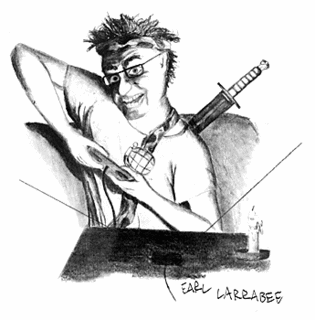6/30/2005
Video Games Entertaining, Not Training Guides For Killers

Illustration by Earl Larrabee By Katie Paulson Arizona Daily WildcatWednesday, June 29, 2005 I am training to be an assassin.
Well, that's not exactly true. But according to a recent lawsuit filed against Take-Two Interactive, the creator of Grand Theft Auto, individuals opposed to such a game believe that video games aid in the production of killers.
Last June, 18-year-old Devin Moore gunned down three men (two police officers and a 911 dispatcher) in Fayette, Alabama, in what was later portrayed as a simulation of events mirroring those found in GTA. For those who haven't experienced this particular game, the basic premise involves the player having free reign to do as he or she pleases in a thinly-disguised U.S. city (Miami, Los Angeles, etc.). In order to gain access to more territory, the player must complete certain missions such as drive other characters around or partake in gang warfare. True, it's a violent game that reproduces murder, prostitution, stealing cars, and other not-so-pleasant imagery. Wait, did someone say game?
The victims' families want not only the creators of GTA but the manufactures of the gaming console (Sony) and the places where Moore purchased the games (Wal-Mart and Game Stop) to be held responsible for generating training grounds for potential murderers.
Unfortunately, their thought processes contain certain incorrect contentions and generalizations. If such a game really did prime youth to commit atrocious crimes, one would expect violent crimes, especially those committed by teenagers, to be increasing exponentially.
But they're not.
Their argument stems from the mentality that the recent surge of popular (and violent) video games contributes to an increase in violent crime within American society. However, statistics from the U.S. Department of Justice depict a different story than the lawsuit plaintiffs offer. In fact, 2003 marked the lowest percentage of violent crimes since 1973 with a decrease from 47.7 percent to 22.3 percent.
Furthermore, when comparing the sheer numbers of video games (namely GTA) purchased to the occurrences of violence that may stem from such extended game playing, the equation simply doesn't add up. Currently, 35 million copies of GTA circulate the globe with worldwide sales nearing $2 billion. Again, why aren't 35 million individuals currently incarcerated for similar crimes?
The majority of video game junkies (myself included) see even the most violent games as another form of entertainment, a stress reliever, and a fantastic way to procrastinate during the school year.
If production crews, marketers, manufacturers, stores, and all the other aspects of consumerism are held responsible for the action of one individual, where would the blame game end? Furthermore, would individuals even be held culpable for their own illegal behavior?
Katie Paulson Columnist
To some, violent video games symbolize only the first of many products that need to be purged for existing outside of the socially accepted norm. After burning copies of Halo and Doom, lobbyists would move on to the world of cinema and rid us of such movies as "Schindler's List," "The Patriot," and even "The Brave Little Toaster" (due to an encouragement of resisting authority and criminal tendencies).
Then, books serve as the next target of attacks. Remove the entire genre of Romance, for it leads to increased promiscuity and impure thoughts. No more horror, historical fiction, or even R.L. Stine.
Although these actions border on the extreme, once a decision is made on the morality and ethical connotations of one video game, it opens the door to a myriad of other censorships and governmental controls. George Orwell's "1984" does not hold the same mystical, impossible qualities when evaluated in this light.
Take-Two Interactive is not the only video game manufacturer to face legal battles. Families of school-shooting victims have lashed out at companies such as IdSoftware, Incorporated and Midway, the creators of "Doom" and "Mortal Kombat" respectively, for contributing to the deaths of their children through the promotion of gore and violence. Judges dismiss the majority of these cases based on first amendment infringements and lack of evidence.
Why are the family members such as Steve Strickland, brother of murdered Fayette police officer Arnold Strickland, determined to shift the guilt from the one who committed the action to the supposed influential factors? In this particular case, Moore was clearly predisposed to commit a crime. From continually living in different foster homes, Moore's life lacked a great deal of adult supervision, guidance and discipline. A recent "60 Minutes" feature on the story illustrated him as a young man who played GTA day and night. Why aren't the families suing his foster parents? Child Protection Services? Someone should be held responsible for allowing him to live in a non-realistic world.
When we refuse to condemn an individual's behavior choices and instead point fingers at corporations and other forms of businesses, we acknowledge that people cannot govern themselves but live under the control of products. The absurdity of such thoughts leaves me pondering when accepting personal responsibility will enter humanity's lexicon again.
Until then, I'll see you in Vice City.
Katie Paulson is a junior majoring in English and Political Science and a huge fan of Goldeneye. You can send her letters and game cheats at letters@wildcat.arizona.edu.